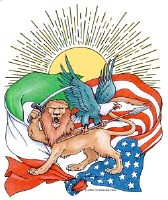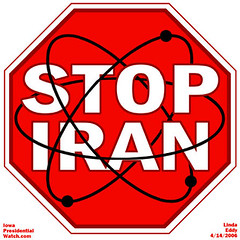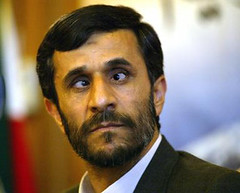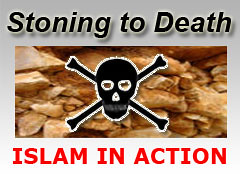NYT: "Britain said on Wednesday that it had closed its embassy in Tehran, withdrawn all its diplomats and ordered Iran to do the same within 48 hours at its own diplomatic mission in London in the worst rupture of relations in decades. The measures were announced in Parliament by Foreign Secretary William Hague a day after Iranian protesters shouting 'Death to England' stormed the British Embassy compound and a diplomatic residence in Tehran, tearing down the British flag, smashing windows, defacing walls and briefly detaining six staff members in what appeared to be a state-sponsored protest against Britain's tough new economic sanctions against Iran. The attack was the most serious diplomatic breach since the traumatic assault on the American Embassy after Iran's Islamic Revolution in 1979. Mr. Hague had initially expressed outrage over the attack, saying Britain held Iran's government responsible and promising 'other, further, and serious consequences.' In Parliament Wednesday he declared: 'We have now closed the British embassy in Tehran. We have decided to evacuate all our staff.' All British diplomats had now left Iran, he said. 'We require the immediate closure of the Iranian embassy in London and all staff must leave in the next 48 hours,' he said... Separately, Norway said it had temporarily closed its embassy in Tehran but had not withdrawn diplomatic personnel. A spokeswoman, Hilde Steinfeld, said the Norwegian authorities decided on the move late Tuesday after the attack on the British facilities." http://t.uani.com/tG9VEO
Reuters: "The European Union condemned an attack on the British embassy in Tehran on Tuesday and called on Iran to protect diplomats on its territory. A spokeswoman for EU foreign policy chief Catherine Ashton said the attack by protesters on two British diplomatic compounds was a 'totally unacceptable incursion'. 'It is with extreme concern that we have learnt that the premises of the Embassy of the United Kingdom in Tehran have been overrun by demonstrators,' Maja Kocijancic said. 'We strongly condemn this totally unacceptable incursion and call on the government of the Islamic Republic of Iran immediately to fulfil its international obligations... to protect diplomats and embassies.'" http://t.uani.com/rzgLR8
AFP: "US Secretary of State Hillary Clinton on Wednesday demanded that Iran protect foreign diplomats as she strongly condemned the storming of the British embassy in Tehran. Speaking to reporters at an aid conference in South Korea, Clinton said the United States condemned the attack on the embassy 'in the strongest possible terms.' 'It is an affront not only to the British people but also to the international community,' Clinton said. 'We stand ready to help in any way that we can to make this point as strongly as possible that governments owe a duty to the diplomatic community to protect life and property and we expect the government of Iran to do so,' she said. In Washington, President Barack Obama also urged Iran to 'hold those who are responsible to task.'" http://t.uani.com/siOCxp
Nuclear Program & Sanctions
NYT: "The large, deadly explosion at an Iran military base in Iran on Nov. 12, which Iranian authorities have called an accident that set back research work there by a few days, appears to have been far more devastating than their description suggested, according to an analysis of newly released commercial satellite images of the blast site. The images reveal vast destruction and chaotic disarray across a sprawling complex composed of more than a dozen buildings and large structures. The Institute for Science and International Security, a private group in Washington, made the satellite images public Monday, along with an analysis of the damage. 'It was pretty amazing to see that the entire facility was destroyed,' Paul Brannan, the report's author, said Tuesday in an interview. 'There were only a few buildings left standing.'" http://t.uani.com/s2tqbS
Bloomberg: "Iran faces new hurdles to getting paid for its oil as the U.S. tightens financial sanctions to deter buyers from the world's third-largest crude exporter. The U.S. approved extra curbs on Iran's banking system and oil industry on Nov. 21, hoping to thwart the country's nuclear program, and the European Union may follow. Current sanctions have led Indian importers to route payments for Iranian crude through a Turkish bank. These refiners, concerned Turkey may stop cooperating amid the latest U.S. rules, are asking banks in Russia to arrange alternatives, said three people with direct knowledge of the situation. 'The idea of the sanctions is to shrink the circle of buyers and so increase their ability to extract discounts from Iran,' said Robin Mills, an analyst at Dubai-based Manaar Energy Consulting, who worked for a decade at Royal Dutch Shell Plc in the Middle East." http://t.uani.com/vOs1XX
FP: "Senate Democrats and Republicans have agreed on a way forward regarding new sanctions on the Central Bank of Iran (CBI) that would impose crippling sanctions on the Iranian economy, with an eye toward preventing a catastrophic consequence for the world oil markets. Last night, Sens. Mark Kirk (R-IL) and Robert Menendez (D-NJ) filed a new amendment to the defense policy bill that represents a compromise of the two separate amendments each had filed last week. The new bipartisan language would build upon the administration's announcement last week that it was naming the CBI as a 'primary money laundering concern' under the Patriot Act and go further than President Barack Obama's Nov. 19 executive order expanding sanctions on Iran's petroleum sector. The Senate amendment would add to that by barring any U.S. financial institution from doing business with any foreign financial institution that knowingly conducted any significant financial transaction with the CBI. The Kirk-Menendez amendment got unanimous consent in the Senate on Monday for consideration on the defense bill, which is on the floor this week. It will get a vote, probably before Dec. 2, and is expected to pass overwhelmingly. The administration has resisted any congressional efforts to force the imposition of Iran sanctions ahead of its own schedule, but Obama will be hard pressed to veto the must-pass defense bill over the issue." http://t.uani.com/tey97w
Reuters: "South African petrochemicals group Sasol said on Wednesday it had entered talks to potentially divest from its operations in Iran, a move already flagged in October. Sasol had said in a filing to the U.S Securities and Exchange Commission last month that there was a possible risk that sanctions may be imposed on the company by the United States, the European Union and the United Nations as a result of its investments in Iran... 'We previously announced our intention to review our investment in Iran and we have subsequently entered into discussions to potentially divest our stake in Arya Sasol Polymers Company,' chief financial officer Christine Ramon said in a statement. Sasol has a 50 percent stake in Arya Sasol Polymer company, a joint venture with Pars Petrochemical Company of Iran. The venture produces ethylene and polyethylene, which are used in the production of plastics." http://t.uani.com/rCMj6k
Reuters: "Iran shrugged off a fresh wave of international economic sanctions against it last week, saying they would have 'no impact' on its trade with other countries. But in Dubai, one of Iran's top trading partners, businessmen are starting to worry. 'The restrictions imposed on the Iranian traders here are getting so hard that they are virtually going to go out of business,' said Morteza Masoumzadeh, a member of the executive committee of the local Iranian Business Council and managing director of the Jumbo Line Shipping Agency. 'They are facing a hell of difficulties. Within a year or two, they will have to shut down. And these traders are dealing with basic commodities. There is no involvement with those banned items, or missile technology,' he said." http://t.uani.com/sw9hTE
Human Rights
AFP: "A UN expert tasked with investigating alleged human rights abuses in Iran will talk to Iranian activists in France, Germany and Belgium this week after a request to visit the country itself was refused. United Nations Special Rapporteur Ahmed Shaheed will meet Iranians living in the three countries during a fact-finding mission from November 30 to December 8. 'A visit to the Islamic Republic of Iran would have allowed me to gain better understanding of the situation,' Shaheed said in a statement. 'However I will now study a wide range of human rights issues by meeting activists within the Iranian diaspora, alleged victims of human rights violations, intergovernmental and civil society organisations,' he said." http://t.uani.com/tWBzw0
Fox News: "The Iranian government calls it the Family Protection Bill, but activists call it the 'Anti-Family Protection Bill.' It would give men the right to take a second wife without the permission of the first, and it would enshrine a man's right to have an unlimited number of temporary marriages, which can last from 10 minutes to 99 years. Those arrangements come from Shariah law and have always existed in Iran, but the Family Protection Bill would make them official. Two groups -- the International Coalition Against Violence in Iran, and the Association of Iranian Researchers -- arranged a press conference in London last week to raise awareness of the issue." http://t.uani.com/rvZYYJ
Opinion & Analysis
Guardian Editorial Board: "There was little dissembling the official nature of the Iranian demonstration that stormed the British embassy and residence in Tehran yesterday. Police used teargas and secured the release of six embassy employees taken by what the semi-official Fars news agency called hardline students. But the students themselves included members of the paramilitary basij brigades and carried banners naming Qassem Suleimani, the commander of the Quds Force, which runs the overseas operations of the Revolutionary Guard. This may not have been a government-sanctioned operation but it was an official one, with three conservative institutions, the parliament, the judiciary and the supreme leader, behind it. So what was going on? The figleaf behind which Britain normally hides is to say that the embassy was attacked because it was there. True, British diplomats had been anticipating a major protest to mark the anniversary of the assassination of the senior Iranian nuclear scientist Majid Shahriari. Shahriari was killed by a hit team on motorcycles, for which Iran has blamed the Mossad. But there is more to this than the traditional Iranian belief, grounded, it has to be said, in history, that Britain is the master string-puller behind all that is bad that happens in Tehran. Britain was the first to cut off dealings with Iran's central bank, following this month's critical report on the Iranian nuclear programme by the International Atomic Energy Agency. Both the US and the EU have yet to do this. Italy and Spain, the largest buyers of Iran's oil in Europe, are opposed to targeting the central bank. As the oil industry, from which the Revolutionary Guard receives its income, relies heavily on the central bank for most of its transactions, Britain presents an obvious target. The Iranian parliament, the Majlis, voted to expel the British ambassador Dominick Chilcott on Sunday, and the parliamentary speaker Ali Larijani called the vote 'just the beginning of the road'. Another Iranian MP was quoted as saying that Britain needed a punch in the mouth. The attack on the embassy was well signposted. The fact that Suleimani's name was on the Revolutionary Guard's calling card is also significant. This is a power struggle on which the west's favourite bete noire, Mahmoud Ahmadinejad, is currently on the losing side." http://t.uani.com/uHGyau
Elliot Abrams in The Weekly Standard: "The attack on the British embassy in Tehran came just days after the Iranian 'parliament' voted to expel the British ambassador, and therefore reeks of official complicity. The attack-complete with an invasion of the grounds, looting, and a brief hostage-taking-is an always useful reminder of the nature of the regime in Tehran. These are thugs, whatever their religious titles. As every nation will condemn this assault on an embassy (the Russians were very quick to do so, for example) we should take advantage of the event. Just a week ago, President Sarkozy of France said, 'as Iran steps up its nuclear program, refuses negotiation and condemns its people to isolation, France advocates new sanctions on an unprecedented scale to convince Iran that it must negotiate....France therefore proposes to the European Union and its member states, the United States, Japan and Canada and other willing countries to take the decision to immediately freeze the assets of the Iranian central bank [and] stop purchases of Iranian oil.' The French proposal is practical. Iran exports about 2.2 million barrels a day. If one assumes that half of it will still be delivered (mostly to Asia), the world oil market can easily absorb the loss of roughly a million barrels a day. It did so easily enough when Libya's exports went from 1.3 million barrels a day in January to almost zero. With Libya returning to the market (exporting 350,000 barrels per day now) and spare Saudi capacity available, exclusion of Iranian exports would not create a crisis. The United States should get behind this proposal immediately, and seek to persuade the UK, Canada, and Japan to join such U.S.-EU action. These steps would strike a hard blow at the Iranian economy, even if there is leakage because the Chinese keep buying Iranian oil. The hope would be that the Iranian economy is sufficiently hurt to cause social unrest." http://t.uani.com/s6hfcA
Michael Rubin in Fox News: "Hardline Iranian students stormed the British embassy in Tehran this morning, smashing windows and burning the British flag. The students, protesting the latest British sanctions imposed on the Islamic Republic as a result of its nuclear defiance, demanded Tehran break relations with London. Rather than protect the embassy, Iranian security forces charged with its protecting simply stood aside suggesting official endorsement of the act. The attack on the embassy follows the Iranian parliament's decision on Sunday to downgrade relations with Great Britain and expel the British ambassador. That vote was 179 in favor of downgrading relations, and four against with 11 abstentions. Importantly, the four parliamentarians who voted against the measure felt that the Iranian government should go even further and sever relations altogether. According to Iran's semi-official Fars News Agency, the radical students carried placards with photographs not only of Majid Shahriari, an assassinated Iranian nuclear scientist, but also Qassem Suleimani, the head of the Qods Force. Suleimani is one of the Islamic Republic's darkest figures responsible, according to American diplomatic cables, for running terror networks across Iraq, Afghanistan, and Lebanon. He is perhaps responsible for the deaths of hundreds of Americans and dozens of British troops. As the Islamic Revolutionary Guard Corps consolidates power inside Iran, Suleimani maintains an increasing chance to become president himself, as Iran's hardline president Mahmoud Ahmadinejad finishes his second and last term. That radical Iranian forces would attack the British embassy should surprise no one. Iranian authorities have never apologized for the seizure of the American embassy 33 years ago. While American diplomats and United Nations officials toast Iran's former reformist president Muhammad Khatami and his call for a 'dialogue of civilizations,' prior to becoming president, Khatami penned a piece praising those who took American diplomats hostage. Not only did Khatami, who ironically was honored at St. Andrews University in Scotland just five years ago, never retract his endorsement of hostage-taking, but he appointed Masoumeh Ebtekar, the spokeswoman of the U.S. embassy captors, to be his vice president." http://t.uani.com/t4rZkX
Wednesday, November 30, 2011
Subscribe to:
Post Comments (Atom)














No comments:
Post a Comment